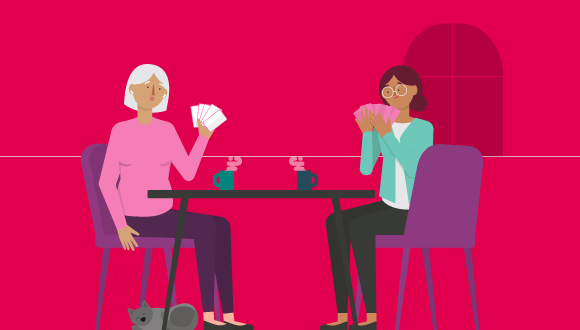How to boost your brain health and lower your risk of dementia
Published May 2025 | 6 min read
Expert contributors: Associate Professor Michael Woodward AM, Honorary Medical Advisor, Dementia Australia; Professor Leon Flicker, Executive Director, Western Australian Centre for Health and Ageing
Words by Trudie McConnochie
Staying mentally strong as you age is essential to our quality of life. Here are some simple tips to boost your brain health and lower your risk of dementia.
Many people assume cognitive decline is inevitable as we age, but thankfully that’s not the case. While ageing is the biggest risk factor for dementia – your risk doubles every five to six years after the age of 65 – you can improve your brain health with simple steps to build your brainpower well into your senior years.
“There are certain areas that decline, like episodic memory – we’re more likely to misplace our keys or forget something that was just told to us – but if it becomes excessive, it’s not normal,” explains Associate Professor Michael Woodward, Honorary Medical Advisor to Dementia Australia.
“There are other areas where we don’t have any decline whatsoever; for instance, wisdom has been shown to increase progressively with age. So, the ability to synthesise a whole lot of patterns and make sense of them and work out the reason for things – these are better done by 80-year-olds than 20-year-olds.”
Your brainpower as you age
As we age, we lose some neurons – the nerve cells that send messages from our brain to all parts of our body. We also experience some damage to the white matter in the brain, says Assoc Prof Woodward. We may joke about 'losing our marbles', but this is a normal part of ageing. It doesn't necessarily mean we’re facing cognitive decline.
The idea that ‘you can’t teach an old dog new tricks’ is also incorrect. Assoc Prof Woodward says your brain can learn new skills even as you get older – and it’s important to keep it active. Making your brain learn and organise information leads to changes in your body. This includes the growth of new connections between neurons, called neuroplasticity.
Lifestyle factors can also play a powerful role in helping to lower the risk of dementia. A recent study found 45% of dementia cases could be prevented or delayed through addressing risk factors like high LDL cholesterol, physical inactivity, smoking, obesity and excessive alcohol.
“One of the things we’ve learned over the years is that a lot of the factors that are associated with good brain health are also associated with good physical health,” says Professor Leon Flicker, Executive Director of the Western Australian Centre for Health and Ageing.

How to boost brain health and prevent dementia
Want to keep your brain as healthy and strong as possible? Drawing on the 2024 update of the Lancet Commission on dementia, these 10 steps can help manage the risk factors for dementia.
1. Stay active
Being physically active helps with blood flow and oxygen supply to your brain and stimulates the growth of new brain cells. Make sure you exercise regularly – aim for at least 30 minutes a day at moderate intensity (so you’re a little out of breath). Include a mixture of:
- aerobic exercise, like brisk walking, dancing or swimming
- resistance training, like lifting weights, push-ups or squats
- flexibility exercises, like yoga, Pilates or stretching.
2. Train your brain
Keeping your brain active is as important as keeping your body active. Challenge your mind regularly through activities like crosswords, crafts or learning new skills. Assoc Prof Woodward says you have to keep pushing yourself to get the brain benefits.
“If you get really good at doing the quick crossword, maybe move to the cryptic version,” he suggests. “Or try something completely different – learn a language, learn a musical instrument or start reading Middle English.”
Getting out of your comfort zone is especially important after you retire, says Assoc Prof Woodward.
“If you can work [and you'd like to] until the mid-70s, you should,” he advises. “If you do retire, make sure you’re doing everything you can to keep yourself socially and mentally active, physically active and eating well.”
3. Eat well
The Mediterranean diet excels when it comes to brain power. It involves eating plenty of vegies, fruits, nuts, legumes, seeds, fish and using olive oil. You can also have a moderate amount of dairy and a little red meat.
Processed meats and packaged foods are best avoided or limited to rare occasions. Assoc Prof Woodward puts it like this: “What we’d eat in a village in Italy or Greece, rather than in an English pub.”
4. Cut back on alcohol
Drinking more than the recommended amount of alcohol can damage your brain and lead to dementia symptoms. If you decide to drink, follow the government guidelines. They recommend no more than four standard drinks a day or 10 a week. One standard drink is about half a glass of wine or a 285ml (half a pint) glass of beer.
Looking to change your relationship with alcohol? Hello Sunday Morning’s Daybreak app is free for all Aussies and connects you anonymously with an online peer community and health coaches. Plus eligible HCF members can also be referred to additional mental health support through Daybreak*.
5. Quit smoking
A study of more than 700,000 people in South Korea suggested quitting smoking lowers the risk of all forms of dementia.
A chat with your GP about how to quit smoking is a great first step, especially if you have an existing health condition. They can also refer you to a psychologist for extra support and put you in touch with Quitline, a confidential telephone counselling service staffed by experts trained in quitting smoking.

6. Stay social
Being socially isolated can raise your risk of cognitive decline. Keeping connections with friends, family and your community is therefore important. But you don’t need to become an extrovert, says Prof Flicker.
“Loneliness is a big risk factor for physical and cognitive health, but you don’t necessarily need a large social network – you need the quality of your social network to be suitable for you.”
7. Look after your mental health
Regular meditation and relaxation exercises can be helpful to add to your routine, as stress can harm your brain cells.
With about 10 to 15% of Australians over the age of 65 experiencing depression, it’s important to seek support if you’re feeling sad, helpless, panicked, irritable or unmotivated for more than two weeks.
If you’re concerned, book an appointment with your GP. Through our partnership with GP2U, an online video GP service, eligible HCF members^ with health cover can access a standard GP consultation (up to 10 minutes) for a fee of $50. Because we know it can be harder to access essential care outside cities, eligible members+ living in rural and remote Australia can access a free 15-minute GP2U consult every year.
A therapist or psychologist can also help. HCF offers eligible members a range of mental health services depending on your needs, including the free HealthyMinds Check-in# with a PSYCH2U psychologist.
8. Monitor your eye and ear health
Along with hearing loss, vision loss increases your dementia risk because sensory challenges make you more socially isolated and can also affect cognitive function, says Prof Flicker.
“Sensory dysfunction is not good, so you should try to correct that as much as you can,” he says.
Talk to your doctor if you suspect your vision or hearing aren’t what they used to be. Eligible members** can get 100% back on a range of No-Gap services – including prescription glasses. Find a participating specialist near you by using our Find a Provider tool.
9. Protect your heart
Looking after your heart by managing blood pressure, cholesterol and blood sugar levels will help keep your brain in good order, too. This includes keeping your weight within a healthy range. Talk to your doctor if you’re concerned.
Eligible members 18 years and older can get a free HCF Heart and Diabetes Health Check, delivered by Victor Chang, at selected locations and dates^^. It only takes 10 minutes and you can get your results right away.
10. Get vaccinated
After the age of 50, getting your zoster (shingles) shots is recommended if you are immunocompetent to reduce your likelihood of getting shingles.
It might have other benefits, too. “Shingles vaccines have been shown to reduce the risk of dementia,” says Assoc Prof Woodward.
When should I be concerned?
It’s normal to forget things from time to time, but Dementia Australia says you should talk to your doctor if you notice you’re forgetting things more than usual, struggling to remember new things or getting confused about things you normally find easy, like directions.
Other signs to watch out for include misplacing things regularly, changes in behaviour like unusual mood swings or loss of inhibitions and decreasing motivation for work, home duties or social activities.
Take charge of your mental wellbeing
Recognising the importance of mental health as we age, we're leading the way with our mental health and wellbeing programs. Designed to help close some of the gaps in the health system, our unique mental health offering gives eligible members# quick and easy access to the support and treatment that’s right for you.
Related articles
How to lower your risk of dementia
With these lifestyle changes you can help keep your brain in top shape and could reduce your risk for dementia.
Memory loss or dementia?
As we age, our focus, ability to retain new information and memory may diminish, but dementia goes much further. Here’s what you need to know.
7 simple ways to improve your memory
Having good recall of information, objects and events isn’t down to good luck – there are lots of things you can actively do to keep your brain sharp.
What food is good for mental health?
We look at the connection between nutrition and your brain and reveal five nutritious foods that can help boost your mental health.
IMPORTANT INFORMATION
* For more information see hcf.com.au/daybreak
^ Eligibility criteria apply. For more information visit hcf.com.au/gp2u
+ Available to members with HCF hospital and/or extras cover, who live in a non-metropolitan MMM2-MMM7 classified postcode. Excludes Accident Only, Ambulance Only and Overseas Visitors Health Cover. Eligible members under 16 years old may need to have a parent or guardian present. If you have any questions about this eligibility criteria, please email welbeing@hcf.com.au
# Eligibility criteria apply. For more information visit hcf.com.au/mental-support
** 100% back from providers in our No-Gap network is available on selected covers. Waiting periods and annual limits apply. Our network of healthcare providers changes often. Please check that your provider is part of our network before you book or attend an appointment. See hcf.com.au/100back
^^ Eligibility criteria apply. For more information see hcf.com.au/victorchang
This communication contains information which is copyright to The Hospitals Contribution Fund of Australia Limited (HCF). It should not be copied, disclosed or distributed without the authority of HCF. Except as required by law, HCF does not represent, warrant and/or guarantee that this communication is free from errors, virus, interception or interference. All reasonable efforts have been taken to ensure the accuracy of material contained on this website. It’s not intended that this website be comprehensive or render advice. HCF members should rely on authoritative advice they seek from qualified practitioners in the health and medical fields as the information provided on this website is general information only and may not be suitable to individual circumstances or health needs. Please check with your health professional before making any dietary, medical or other health decisions as a result of reading this website.